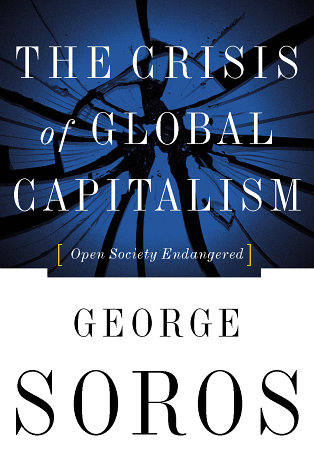0009. THE CRISIS OF GLOBAL CAPITALISM : 1 ใน 109 หนังสือควรอ่าน จาก นายกฯ ทักษิณ ชินวัตร


เมื่อวันที่ 11 กรกฏาคม 2542 พ.ต.ท. ดร.ทักษิณ ชินวัตร กล่าวในปาฐกถา เรื่อง "เมืองไทยในศตวรรษใหม่" ซึ่งจัดโดย สภาหอการค้าไทย มีข้อความตอนหนึ่งว่า....
...."หลายคน คงเคยอ่านหนังสือเล่มล่าสุดของโซรอส เรื่อง The Crisis of Global Capitalism โซรอส ได้อธิบายถึง ประชาธิปไตยกับทุนนิยมโลกว่า ภายใต้ระบอบประชาธิปไตยนี้ หัวใจอย่างหนึ่ง คือ การแข่งขันเสรีมีระบบทุนนิยมที่ต้องอยู่ร่วมกัน แต่ทุกคนก็รู้ว่า หลักของทุนนิยม คือ ปลาใหญ่กินปลาเล็ก คนที่มีกำลังแข็งกว่าเท่านั้นจึงจะชนะการแข่งขัน สิ่งที่เรามองว่าเสรี ความจริงก็ไม่เสรีแท้ๆ"
| Create Date : 04 มีนาคม 2551 |
| Last Update : 4 มีนาคม 2551 7:06:46 น. |
|
11 comments
|
| Counter : 1675 Pageviews. |
 |
|
|
ทัศนะของจอร์ช โซรอส
สรุปและวิจารณ์โดย วิทยากร เชียงกูล
[ คัดเลือกมาบางส่วนจากหนังสือ วิกฤติระบบทุนนิยมโลกในทัศนะ จอร์ช โซรอส สรุปและวิจารณ์โดย วิทยากร เชียงกูล, สำนักพิมพ์มิ่งมิตร 2542]
George Soros, "The Crisis of Global Capitalism: Open Society Endangered."
จอร์ช โซรอส
"คุณจะบอกว่า ผมคือคนที่เข้ามาตักตวงผลประโยชน์ ดังนั้นจึงไม่ควรฟัง สิ่งที่ผมพูด ก็แล้วแต่คุณ หากแต่ความจริงก็คือ การที่ผมทำเงินได้อย่าง มหาศาลนั้น ย่อมเป็นข้อพิสูจน์แล้วว่า ระบบตลาดนั้นไม่ดีจริง คนอย่างผม จึงสังเกตเห็นและเข้ามาหาประโยชน์จนร่ำรวยขนาดนี้ได้"
จอร์ช โซรอส
(ให้สัมภาษณ์สถานีโทรทัศน์ ซี เอ็น เอ็น หลังจากกรณีที่เขาทำกำไรจากการลงทุนแบบ เก็งกำไรได้มากกว่า 2 พันล้านดอลลาร์ ในช่วงเวลาไม่กี่วัน ในตลาดการเงินในยุโรป เดือนกันยายน ปี พ.ศ.2535)
สารบัญ
คำนำโดยผู้เรียบเรียง
บทเกริ่นและคำนำ (ของจอร์ช โซรอส)
โอกาสที่จะผิดพลาดได้และปฏิสัมพันธ์แบบส่งผลสะท้อนกลับ (Fallibility and Reflexivity)
วิพากษ์วิชาเศรษฐศาสตร์
ปฏิสัมพันธ์แบบส่งผลสะท้อนกลับในตลาดการเงิน
ระบบทุนนิยมโลก
วิกฤติการเงินของโลก
Biographical Information
From the Book
Forewords & Introductions
Editorial:Soros alone cannot be blamed for crisis
คำนำโดยผู้เรียบเรียง
หนังสือเล่มนี้เป็นงานเชิงแนะนำและวิจารณ์หนังสือภาษาอังกฤษ ชื่อ The Crisis of Global Capitalism ซึ่งเป็นหนังสือเล่มล่าสุดของ จอร์ช โซรอส (1930 - ) ผู้เป็นที่รู้จักในฐานะพ่อมดทางการเงิน หรือที่ปรึกษานักลงทุนทางด้านการเงินระหว่างประเทศที่ประสบความสำเร็จมากที่สุด เป็นทั้งมหาเศรษฐกิจ เป็นนักคิดนักเขียน และนักรณรงค์เพื่อการพัฒนาสังคมที่มีชื่อเสียง ทั้งในแง่ความสำเร็จและในแง่การมีความคิดวิพากษ์วิจารณ์ที่นอกคอก
โซรอส เป็นชาวฮังการีเชื้อสายยิว ซึ่งต้องเอาตัวให้รอดจากการตามล้างผลาญ ของพวกนาซีเยอรมัน เขาอพยพไปอังกฤษตั้งแต่วัยรุ่น และทำงานไปด้วยเรียนไปด้วย เขาเรียนจบปริญญาตรีทางเศรษฐศาสตร์การเมืองจากสำนักเศรษฐศาสตร์การเมือง แห่งมหาวิทยาลัยลอนดอน (L.S.E) สำนักเดียวกับ อ.ป๋วย อึ๊งภากรณ์ หลังจากทำงาน ในบริษัทลงทุนทางด้านการเงินในอังกฤษอยู่ระยะหนึ่งก็ย้ายไปที่สหรัฐฯ ซึ่งทำให้เขาประสบความสำเร็จในฐานะที่ปรึกษานักลงทุนในตลาดการเงิน ผู้มีรายได้จากเงินเดือนและค่าคอมมิชชั่นการเป็นที่ปรึกษา กว่าปีละพันล้านดอลลาร์ ตั้งแต่ปี พ.ศ.2536 เป็นต้นมา นิตยสารฟอร์ปส์ ประเมินในปี พ.ศ.2540 ว่า โซรอสมีทรัพย์สินราว 3.5 พันล้านดอลลาร์ เป็นมหาเศรษฐีอันดับที่ 27 ของโลก
โซรอส เริ่มใช้เงินส่วนตัวจัดตั้งกองทุนสังคมเปิด (Open Society Fund) ซึ่งเป็นมูลนิธิที่ทำงานรณรงค์เพื่อสร้างสรรค์สังคมประชาธิปไตยแบบเสรีนิยมในยุโรปกลาง ยุโรปตะวันออก และประเทศอื่นๆ ตั้งแต่ปี 2522 ในสมัยที่ี่เขายังไม่ได้ร่ำรวยมากนัก เมื่อเขายิ่งรวยขึ้น เขาก็ยิ่งบริจาคให้มูลนิธิมากขึ้น ปัจจุบันมูลนิธิดังกล่าวมีสาขาอยู่ใน 31 ประเทศ และใช้งบฯดำเนินการปีละประมาณ 400 ล้านดอลลาร์สหรัฐฯ โซรอสเขียนหนังสือหลังจากที่เขามีชื่อเสียงในฐานะนักลงทุนแล้ว 2 เล่ม คือ The Alchemy of Finance (การเล่นแร่แปรธาตุของตลาดการเงิน) และ SOROS ON SOROS
สำหรับหนังสือเล่มล่าสุดของเขา ที่ผม (วิทยากร เชียงกูล) นำมาเขียนแนะนำ เชิงวิจารณ์เล่มนี้ มีชื่อเต็มว่า The Crisis of Global Capitalism (Open Society Endangered) วิกฤติของระบบทุนนิยมโลก (สังคมเปิดกำลังจะสูญพันธุ์) เป็นหนังสือที่เพิ่งเขียนและพิมพ์เผยแพร่เมื่อปลายปี 2541 นี้เอง ครอบคลุมถึง สถานการณ์วิกฤติในเอเชีย และรุสเซีย (แต่เขียนก่อนเกิดวิกฤติในบราซิล) ผมเห็นว่าเป็นหนังสือที่มีแนวคิดที่ก้าวหน้า ท้าทายและน่าสนใจมากกว่างานของ นักเศรษฐศาสตร์ส่วนใหญ่ในประเทศไทยในปัจจุบัน ผมจึงได้ทำบทแนะนำเชิงวิจารณ์มาเสนอให้คนไทยส่วนใหญ่ ซึ่งคงจะไม่มีโอกาสได้อ่านกัน ได้รับรู้ว่า ในโลกนี้ยังมีแนวคิดที่แตกต่างไปจาก ทฤษฎีเศรษฐศาสตร์แบบบูชาระบบตลาด หรือแนวคิดแบบไอเอ็มเอฟ-ธารินทร์ ที่เป็นแนวคิดที่ครอบงำสังคมไทยในเวลานี้อยู่มาก
โซรอส เป็นคนที่มีภาพลักษ์ขัดแย้งกันอย่างซับซ้อน คุณถนัด คอมันตร์ อดีตรัฐมนตรีต่างประเทศของเราเรียกเขาว่า มหาโจรโซรอส มหาเธร์ นายกรัฐมนตรีมาเลเซียโจมตีว่า เขาคือ นักเก็งกำไรค่าเงินที่ทำให้เกิดวิกฤติเอเชีย คนในประเทศทุนนิยมพัฒนาอุตสาหกรรมเรียกเขาว่าโรบินฮู๊ดสมัยใหม่ ผู้ปล้นจากโลกตะวันตกที่ร่ำรวยไปช่วยโลกตะวันออกที่ยากจนกว่า คนอังกฤษ ซึ่งรัฐบาลเคยขาดทุนจากการไปพยุงค่าเงินปอนด์เพื่อสู้กับโซรอส (และผู้ลงทุนเก็งกำไรคนอื่นๆ) ไม่ต่ำกว่า 1,000 ล้านดอลลาร์ ในปี 2535 วิจารณ์ว่าเพราะรัฐบาลอังกฤษโง่กว่าโซรอสเอง จึงควรโทษรัฐบาลอังกฤษ มากกว่าจะโทษโซรอส ซึ่งเล่นตามกติกาของระบบทุนนิยมโลก (กรณีนี้ฟังดูคุ้นๆ กับกรณีรัฐบาลไทยในปี 2540)
ไม่ว่าตัวตนที่แท้จริงของโซรอสจะเป็นอย่างไร แนวคิดแนววิเคราะห์ของเขา มีประเด็นที่น่าสนใจ ไม่ใช่เพราะเขาเป็นคนดังระดับโลก เป็นมหาเศรษฐีที่อยากเป็นนักเขียน อยากเป็นปัญญาชนที่มีอิทธิพลต่อการเปลี่ยนแปลงโลกเท่านั้น แต่เป็นเพราะว่านี่คือการวิจารณ์ระบบทุนนิยมโลกจากคนที่รู้จักทุนนิยมโลกอย่างดีมาก และเป็นเพราะว่าประชาชนส่วนใหญ่รวมทั้งนักวิชาการของไทย หรือแตกต่างจากแนวคิดเศรษฐศาสตร์แบบบูชาระบบตลาดอย่างหลงใหล
แนวคิดของโซรอสที่น่าสนใจคือ การวิพากษ์เศรษฐศาสตร์, สังคมศาสตร์ และระบบทุนนิยมโลก ส่วนข้อเสนอแนะทางออกของเขาสู้การวิพากษ์ไม่ได้ เพราะมีลักษณะปฏิรูปจากข้างบนลงมา เพื่อปรับปรุงให้ระบบทุนนิยมโลก มีความทันสมัยและอยู่ได้ยั่งยืนขึ้น แนวคิดเชิงวิพากษ์วิจารณ์ของโซรอสในหนังสือเล่มนี้ น่าจะช่วยกระตุ้นให้มีการคิดใหม่กันได้มากพอสมควร แม้แนวคิดหลายอย่างของเขา จะไม่ได้ใหม่มากนักสำหรับนักวิชาการกลุ่มก้าวหน้าของไทย ที่สนใจแนวคิดทางเลือกกระแสใหม่ ที่ต่างจากเศรษฐศาสตร์กระแสเก่าอยู่แล้ว แต่เราก็ยังเรียนรู้จากเขาได้ ถ้าอ่านงานของเขาอย่างวิพากษ์วิจารณ์
ขณะที่ผมได้หนังสือเล่มนี้มา ผมกำลังค้นคว้าหนังสือหลายเล่มเพื่อเขียนเรื่อง "เศรษฐศาสตร์แนวใหม่ ทางแก้ไขวิกฤติได้อย่างยั่งยืน"อยู่ และคิดว่าคงต้องใช้เวลาอีก หลายเดือน จึงจะแล้วเสร็จ จึงใช้เวลาสั้นๆ ประมาณ 2 3 สัปดาห์ เขียนบทแนะนำ เชิงวิจารณ์หนังสือเล่มนี้ออกมาก่อน เพื่อเป็นการเริ่มเปิดประเด็นวิพากษ ์เศรษฐศาสตร์แบบบูชาระบบตลาด และระบบคุณค่าที่วัดทุกอย่างด้วยเงิน ที่เป็นตัวการ สำคัญในการสร้างวิกฤติและหายนะให้สังคมไทย และสังคมโลกอยู่ในเวลานี้
วิทยากร เชียงกูล
ศูนย์วิจัยทางด้านสังคมศาสตร์ มหาวิทยาลัยรังสิต
17 กุมภาพันธ์ 2542